0. Miren Etxezarreta Artxibo Funtsa
Fitxa multzoa
- Identificador (rico:identifier)
- ME_A 0.
- Tiene como tipo de agrupación documental (rico:hasRecordSetType)
- Funtsa
- Título (rico:title)
- eu 0. Miren Etxezarreta Artxibo Funtsa
- es 0. Fondo de Archivo Miren Etxezarreta
- en 0. Miren Etxezarreta Archive Fund
- Descripción general (rico:generalDescription)
-
es
Fondo persona de Miren Etxezarreta en el archivo municipal de Ordizia
- Baliabide klasea
- Record Set
Fitxak
-
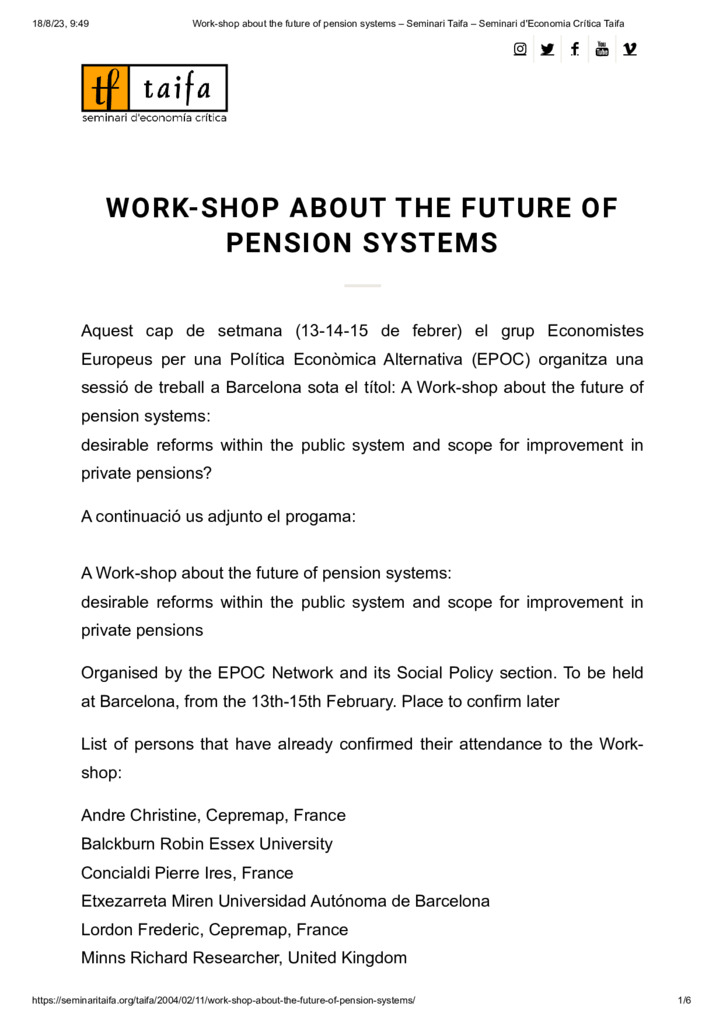 Aquest cap de setmana (13-14-15 de febrer) el grup Economistes Europeus per una Política Econòmica Alternativa (EPOC) organitza una sessió de treball a Barcelona sota el títol: A Work-shop about the future of pension systems: desirable reforms within the public system and scope for improvement in private pensions? A continuació us adjunto el progama: A Work-shop about the future of pension systems: desirable reforms within the public system and scope for improvement in private pensions Organised by the EPOC Network and its Social Policy section. To be held at Barcelona, from the 13th-15th February. Place to confirm later List of persons that have already confirmed their attendance to the Work-shop: Andre Christine, Cepremap, France Balckburn Robin Essex University Concialdi Pierre Ires, France Etxezarreta Miren Universidad Autónoma de Barcelona Lordon Frederic, Cepremap, France Minns Richard Researcher, United Kingdom Sawyer Malcolm University of Leeds Zubiri Ignacio Universidad del País Vasco, Spain The purpose of the Work-shop: For the last two years the EPOC group on Pensions has been analysing the strong trend towards privatisation of the public systems of pensions in the world and especially in the European Union and the will be- new members. Out of this work the group has concluded that the private systems are not better for the welfare of pensioners, the population in general and the functioning of the economy and society than the public systems, and that the danger of an economic crisis of the public systems is rather dubious and in any case much lighter than it is asserted and possible to counter if adequate measures are taken. Therefore it has come out clearly in favour of the maintenance of the public systems and against the development of private systems. The work-shop does not propose to come back to revise those arguments and counter arguments for the privatisation of pensions but considers that they have already been settled for the purposes of our work, therefore the objective of the Workshop is to advance towards the design of improvements of the present public pension systems. However it is recognised that the changes that are taking place in the labour market and in society require to be considered in relation with the public system of pensions if their functionality to increase the welfare of the populations and the efficiency of the system is to be maintained and improved. Because of it, it is considered that a revision of the existing proposals for improvement of the system and an ample debate about the nature and main features of the public pension systems and how to improve them in the future may be of social interest. Also, although the position of the Group is in favour of the reinforcement of the public systems, unfortunately this is not what is happening in our societies and private systems are being developed and expanded mainly under the orientation of public and private organisations that are more preoccupied by budgetary limits of the governments, expansion of financial markets or even only about greater profits for the financial institutions involved. It is considered here that it may be worthwhile too to discuss about the ways in which if private systems are developed they may be socially designed in order to defend and improve the interests of pensioners and stakeholders. We propose to devote the Work-shop to these two aims which are, of course, closely related. Methodology: The idea of the Work-shop is to provide an opportunity for informal discussion about the selected topics in order to advance towards building up some suggestions to improve the present pension systems, with the focus placed about securing the improvement and financial availability of the public pension systems. The plan of the meeting is to devote as much time as possible to discussion of the different issues. Thinking jointly and discussing the more relevant points may be more fruitful than presenting full papers. However, since some of the persons attending the meeting have proposed to present papers, at the Sessions more closely related to the themes of the proposed papers we could start with a short presentation of the papers as an introduction to the discussion. However, forgive me if I stress that we should not think in terms of formal Sessions for presentation of papers but devote most of our time to discussion and drawing of suggestions to improve the present pension systems. Even if a Coordinator is assigned to each session free discussion should be encouraged. Although an Agenda for the meeting is advanced we should consider it in a very flexible way and if we wish to devote more or less time than the proposed to a specific subject changes may be done. Also, although the names of Coordinators are given, please let me know if any of you prefer to coordinate a different Session. Agenda: Friday 13th. 17.00- 17.30: Arrival and welcome 17.30- 19.30 Session 1: Ideas to improve the present public pension systems. Ways in which the present public systems could be improved, from different view points: .. ways to improve and secure the financial availability of the public pension systems: improving the labour market, the scope to increase contributions, the role of taxation ? .. national situations and European convergence: desirability and/or possibilities of convergence of different European systems: establishing minimum or average norms around social/pension expenditure in relation with GDP, replacement rates: relation with wages, minimum wage or poverty levels? .. the special situation of the CEE countries There will be a short paper by P. Concialdi to introduce the subject Coordinator: Pierre Concialdi Saturday 14th 9.30- 11.30 Session 2: Labour markets and Pension systems. How can the public pension systems take into account the changes in the labour market (labour precariousness, new trends in labour careers, self-employment, shorter working lives?) How the efficiency of the present public systems may be improved. Social agents and the pension issue. The role of Unions. The reaction of workers to Pension Reform. Coordinator: Christine André 11.30-12.00 Pause 12.00- 14.00 Session 3: Labour based systems or citizenship based ones? Exploring the scope of citizenship based systems, their impact in society and labour markets, their requirements ( economic and social). May Basic Income be a substitute for pensions or it plays a different role? How to reconcile the egalitarian approach with a maintenance of standard of living approach? The economic requirements of Basic Income; the labour and social requirements. Coordinator: Miren Etxezarreta 14.00-16.00 Lunch 16.00-18.00 Session 4: Towards improvement of the private systems. Main shortcomings of the private systems: uncertainty, high costs, low rewards? The control of managers. The question of participation of pensioners: What type of participation? The problems of representation. Coordinator: Ignacio Zubiri 18.00- 18.30 Pause 18.30- 20.30 Session 5: Pensions are not only pensioners business. Pensions and the accumulation process: the weight of financial interests as limits to improvement of pensions systems. The European Union policies and the pension systems: impact of the Stability and Growth Pact and the building up of an European Integrated financial market in the possibilities of financing better systems. The macroeconomics of pension systems. New ways of financing pensions systems. The real costs of pension systems: fiscal rebates and subsidies (do we have any data about subsidies to private systems?If we had them it may be a good idea to bring them along to allow for more concrete discussions) Coordinators: M. Sawyer and R. Minns Sunday 15th 9.30-11.30 Session 6: Private systems as mechanisms for social participation. The debate about the scope to utilise pension funds as an instrument for social participation. Employees ownership: its possibilities, its risks, its deception. May employees ownership change the distribution of power and the social relations? There will be a paper by R. Blackburn, and it may be one by F. Lordon Coordinators: R. Blackburn and F. Lordon 11.30.12.0Pause 12.00- 14.00 Session 7: Conclusions and recommendations. We should end up with some proposals or at least with the identification of some further fields of work to advance in the desired direction. Coordinator: Miren Etxezarreta Barcelona, 30th January 2004
Aquest cap de setmana (13-14-15 de febrer) el grup Economistes Europeus per una Política Econòmica Alternativa (EPOC) organitza una sessió de treball a Barcelona sota el títol: A Work-shop about the future of pension systems: desirable reforms within the public system and scope for improvement in private pensions? A continuació us adjunto el progama: A Work-shop about the future of pension systems: desirable reforms within the public system and scope for improvement in private pensions Organised by the EPOC Network and its Social Policy section. To be held at Barcelona, from the 13th-15th February. Place to confirm later List of persons that have already confirmed their attendance to the Work-shop: Andre Christine, Cepremap, France Balckburn Robin Essex University Concialdi Pierre Ires, France Etxezarreta Miren Universidad Autónoma de Barcelona Lordon Frederic, Cepremap, France Minns Richard Researcher, United Kingdom Sawyer Malcolm University of Leeds Zubiri Ignacio Universidad del País Vasco, Spain The purpose of the Work-shop: For the last two years the EPOC group on Pensions has been analysing the strong trend towards privatisation of the public systems of pensions in the world and especially in the European Union and the will be- new members. Out of this work the group has concluded that the private systems are not better for the welfare of pensioners, the population in general and the functioning of the economy and society than the public systems, and that the danger of an economic crisis of the public systems is rather dubious and in any case much lighter than it is asserted and possible to counter if adequate measures are taken. Therefore it has come out clearly in favour of the maintenance of the public systems and against the development of private systems. The work-shop does not propose to come back to revise those arguments and counter arguments for the privatisation of pensions but considers that they have already been settled for the purposes of our work, therefore the objective of the Workshop is to advance towards the design of improvements of the present public pension systems. However it is recognised that the changes that are taking place in the labour market and in society require to be considered in relation with the public system of pensions if their functionality to increase the welfare of the populations and the efficiency of the system is to be maintained and improved. Because of it, it is considered that a revision of the existing proposals for improvement of the system and an ample debate about the nature and main features of the public pension systems and how to improve them in the future may be of social interest. Also, although the position of the Group is in favour of the reinforcement of the public systems, unfortunately this is not what is happening in our societies and private systems are being developed and expanded mainly under the orientation of public and private organisations that are more preoccupied by budgetary limits of the governments, expansion of financial markets or even only about greater profits for the financial institutions involved. It is considered here that it may be worthwhile too to discuss about the ways in which if private systems are developed they may be socially designed in order to defend and improve the interests of pensioners and stakeholders. We propose to devote the Work-shop to these two aims which are, of course, closely related. Methodology: The idea of the Work-shop is to provide an opportunity for informal discussion about the selected topics in order to advance towards building up some suggestions to improve the present pension systems, with the focus placed about securing the improvement and financial availability of the public pension systems. The plan of the meeting is to devote as much time as possible to discussion of the different issues. Thinking jointly and discussing the more relevant points may be more fruitful than presenting full papers. However, since some of the persons attending the meeting have proposed to present papers, at the Sessions more closely related to the themes of the proposed papers we could start with a short presentation of the papers as an introduction to the discussion. However, forgive me if I stress that we should not think in terms of formal Sessions for presentation of papers but devote most of our time to discussion and drawing of suggestions to improve the present pension systems. Even if a Coordinator is assigned to each session free discussion should be encouraged. Although an Agenda for the meeting is advanced we should consider it in a very flexible way and if we wish to devote more or less time than the proposed to a specific subject changes may be done. Also, although the names of Coordinators are given, please let me know if any of you prefer to coordinate a different Session. Agenda: Friday 13th. 17.00- 17.30: Arrival and welcome 17.30- 19.30 Session 1: Ideas to improve the present public pension systems. Ways in which the present public systems could be improved, from different view points: .. ways to improve and secure the financial availability of the public pension systems: improving the labour market, the scope to increase contributions, the role of taxation ? .. national situations and European convergence: desirability and/or possibilities of convergence of different European systems: establishing minimum or average norms around social/pension expenditure in relation with GDP, replacement rates: relation with wages, minimum wage or poverty levels? .. the special situation of the CEE countries There will be a short paper by P. Concialdi to introduce the subject Coordinator: Pierre Concialdi Saturday 14th 9.30- 11.30 Session 2: Labour markets and Pension systems. How can the public pension systems take into account the changes in the labour market (labour precariousness, new trends in labour careers, self-employment, shorter working lives?) How the efficiency of the present public systems may be improved. Social agents and the pension issue. The role of Unions. The reaction of workers to Pension Reform. Coordinator: Christine André 11.30-12.00 Pause 12.00- 14.00 Session 3: Labour based systems or citizenship based ones? Exploring the scope of citizenship based systems, their impact in society and labour markets, their requirements ( economic and social). May Basic Income be a substitute for pensions or it plays a different role? How to reconcile the egalitarian approach with a maintenance of standard of living approach? The economic requirements of Basic Income; the labour and social requirements. Coordinator: Miren Etxezarreta 14.00-16.00 Lunch 16.00-18.00 Session 4: Towards improvement of the private systems. Main shortcomings of the private systems: uncertainty, high costs, low rewards? The control of managers. The question of participation of pensioners: What type of participation? The problems of representation. Coordinator: Ignacio Zubiri 18.00- 18.30 Pause 18.30- 20.30 Session 5: Pensions are not only pensioners business. Pensions and the accumulation process: the weight of financial interests as limits to improvement of pensions systems. The European Union policies and the pension systems: impact of the Stability and Growth Pact and the building up of an European Integrated financial market in the possibilities of financing better systems. The macroeconomics of pension systems. New ways of financing pensions systems. The real costs of pension systems: fiscal rebates and subsidies (do we have any data about subsidies to private systems?If we had them it may be a good idea to bring them along to allow for more concrete discussions) Coordinators: M. Sawyer and R. Minns Sunday 15th 9.30-11.30 Session 6: Private systems as mechanisms for social participation. The debate about the scope to utilise pension funds as an instrument for social participation. Employees ownership: its possibilities, its risks, its deception. May employees ownership change the distribution of power and the social relations? There will be a paper by R. Blackburn, and it may be one by F. Lordon Coordinators: R. Blackburn and F. Lordon 11.30.12.0Pause 12.00- 14.00 Session 7: Conclusions and recommendations. We should end up with some proposals or at least with the identification of some further fields of work to advance in the desired direction. Coordinator: Miren Etxezarreta Barcelona, 30th January 2004 -
 Se celebra en Barcelona un juicio popular contra Florentino Pérez y el ministro de Energía, Álvaro Nadal, por los impactos sociales, medioambientales y financieros del proyecto Castor. Fuente: El salto
Se celebra en Barcelona un juicio popular contra Florentino Pérez y el ministro de Energía, Álvaro Nadal, por los impactos sociales, medioambientales y financieros del proyecto Castor. Fuente: El salto -
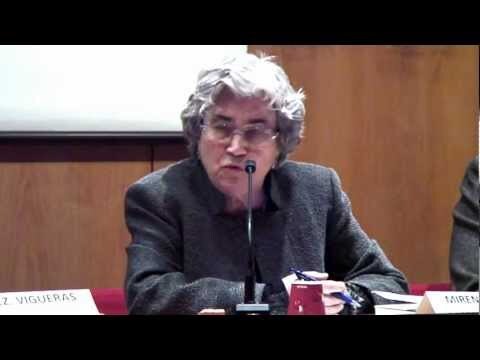 Miren Etxezarretaren hitzaldia aurrekoan Juan Hdez Vigueresen "El casino que nos gobierna" liburuaren esaldia
Miren Etxezarretaren hitzaldia aurrekoan Juan Hdez Vigueresen "El casino que nos gobierna" liburuaren esaldia -
 Hem passat dels joves indignats als avis indignats? Com pot viure un pensionista avui en dia a l'estat espanyol? Quin futur tenen les pensions privades? Hem comentat la situació actual de les pensions amb Domiciano Sandoval, portaveu de la Marea Pensionista, i la Miren Etxezarreta, catedràtica emèrita d'Economia Aplicada. Font: TV3
Hem passat dels joves indignats als avis indignats? Com pot viure un pensionista avui en dia a l'estat espanyol? Quin futur tenen les pensions privades? Hem comentat la situació actual de les pensions amb Domiciano Sandoval, portaveu de la Marea Pensionista, i la Miren Etxezarreta, catedràtica emèrita d'Economia Aplicada. Font: TV3 -
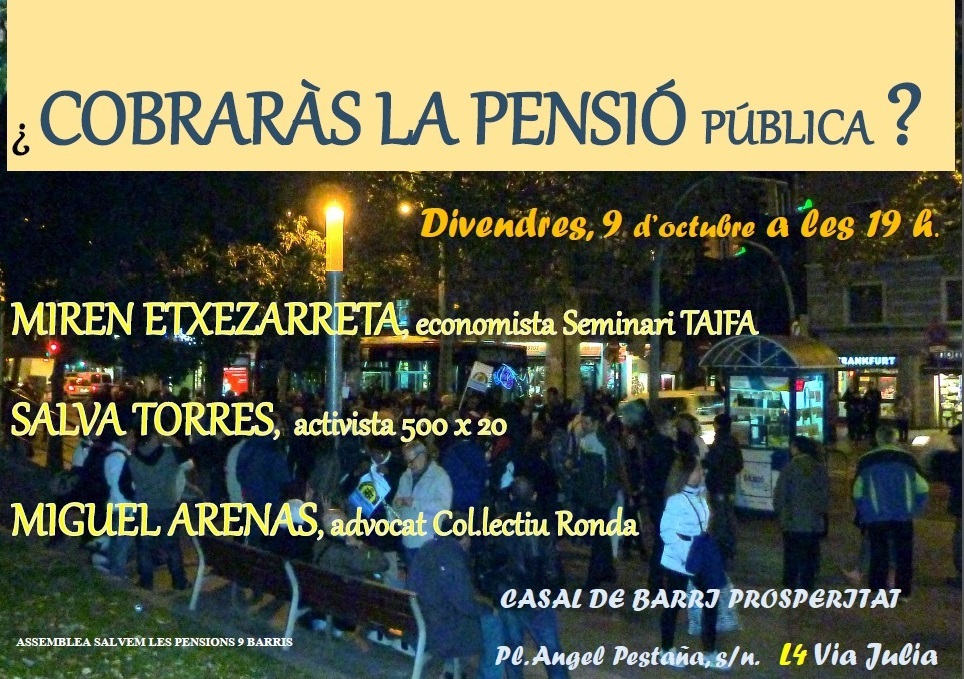 Miren Etxezarreta (economista Seminari Taifa), Salva Torres (activista Associació 500×20 ) i Miguel Arenas (Advocat i soci del Col·lectiu Ronda. Llicenciat en Dret ) ens parlen de Pensions Públiques, bancs, hipoteques, d'Economia en general. Economia sense colors, real. En un llenguatge entenedor, independent, que mai veurem pels mitjans habituals d'informació (o, més ben dit, de desinformació) Organitzat per L'Assemblea Salvem les Pensions 9 Barris
Miren Etxezarreta (economista Seminari Taifa), Salva Torres (activista Associació 500×20 ) i Miguel Arenas (Advocat i soci del Col·lectiu Ronda. Llicenciat en Dret ) ens parlen de Pensions Públiques, bancs, hipoteques, d'Economia en general. Economia sense colors, real. En un llenguatge entenedor, independent, que mai veurem pels mitjans habituals d'informació (o, més ben dit, de desinformació) Organitzat per L'Assemblea Salvem les Pensions 9 Barris -
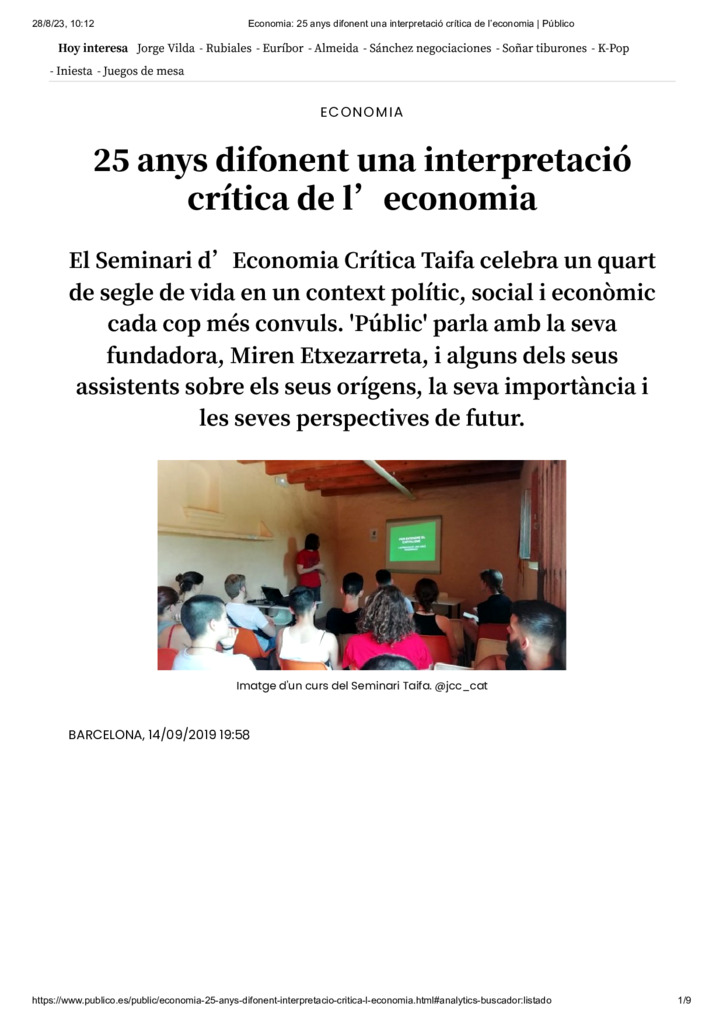
-
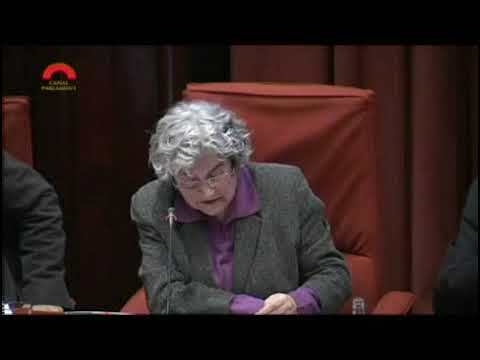 Comisió d'Economía, finances i Pressupost (Parlament de Catalunya) 7/03/2012 Debate del Projecte de Llei d'estabilitat pressupostària
Comisió d'Economía, finances i Pressupost (Parlament de Catalunya) 7/03/2012 Debate del Projecte de Llei d'estabilitat pressupostària -
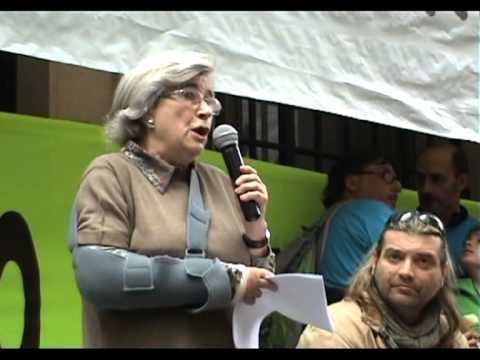
-
 Las consecuencias sociales y económicas de la guerra de sanciones contra Rusia en el marco de la guerra de Ucrania: qué hacer para detenerla. La visión de la juventud. Miren Etxezarreta (economista), Pol Mena (CCOO), Isaac Salinas (IAC), José Domingo (CO.BAS), Conchita Ribera (COESPE), Sara Leyva, Jordi Trujillo (Coord. Parados).
Las consecuencias sociales y económicas de la guerra de sanciones contra Rusia en el marco de la guerra de Ucrania: qué hacer para detenerla. La visión de la juventud. Miren Etxezarreta (economista), Pol Mena (CCOO), Isaac Salinas (IAC), José Domingo (CO.BAS), Conchita Ribera (COESPE), Sara Leyva, Jordi Trujillo (Coord. Parados). -
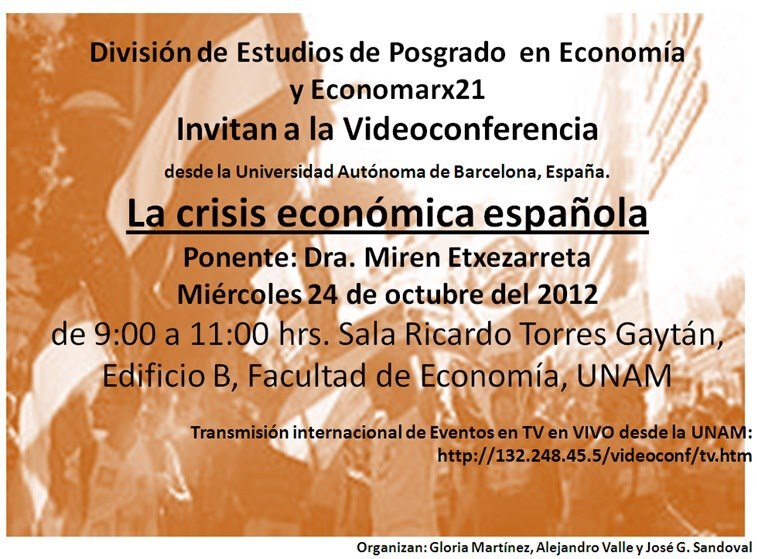
-
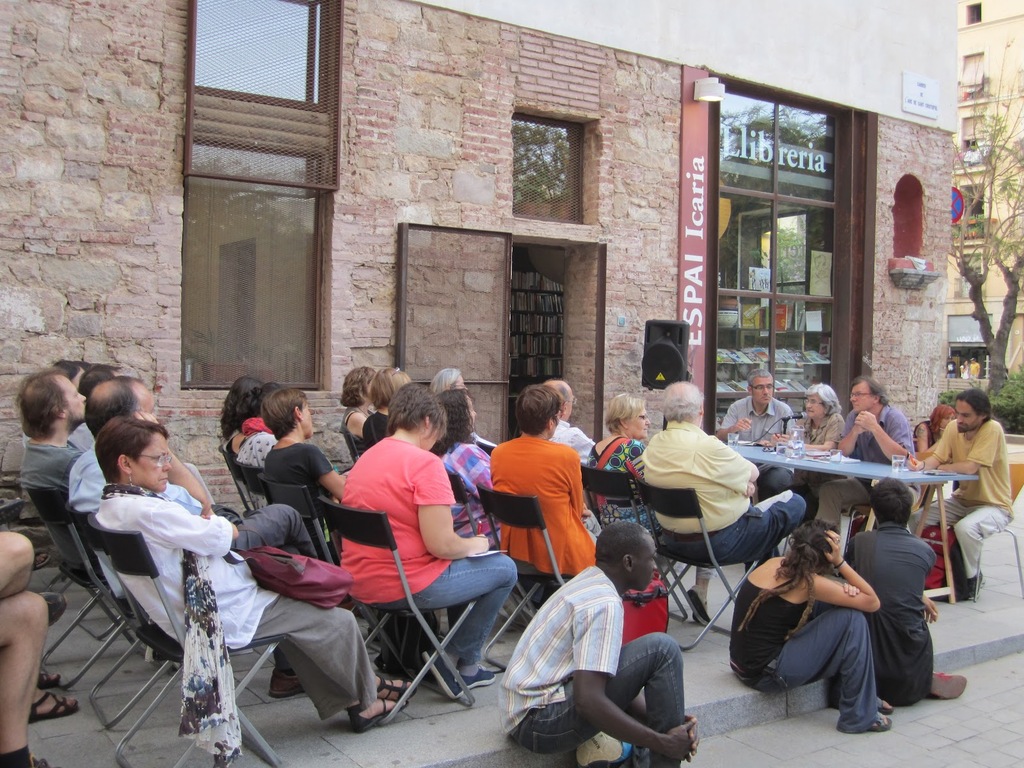 El Martes 19 de junio de 2012 en el Forat de la Vergonya se presentaron los libros Food Wars (Editorial Virus) y El gran robo de los alimentos (Icaria Editorial).EL acto contó con las intervenciones de Miren Etxezarreta, economista y catedrática de Economía Aplicada, Gustavo Duch, coordinador de la revista Soberanía alimentaria, biodiversidad y culturas, Henk Hobbelink, agrónomo, miembro de GRAIN y coautor de El gran robo de los alimentos y Diego Durán, miembro de Ecologistes en Acció. Fuente: Icaria libros
El Martes 19 de junio de 2012 en el Forat de la Vergonya se presentaron los libros Food Wars (Editorial Virus) y El gran robo de los alimentos (Icaria Editorial).EL acto contó con las intervenciones de Miren Etxezarreta, economista y catedrática de Economía Aplicada, Gustavo Duch, coordinador de la revista Soberanía alimentaria, biodiversidad y culturas, Henk Hobbelink, agrónomo, miembro de GRAIN y coautor de El gran robo de los alimentos y Diego Durán, miembro de Ecologistes en Acció. Fuente: Icaria libros -
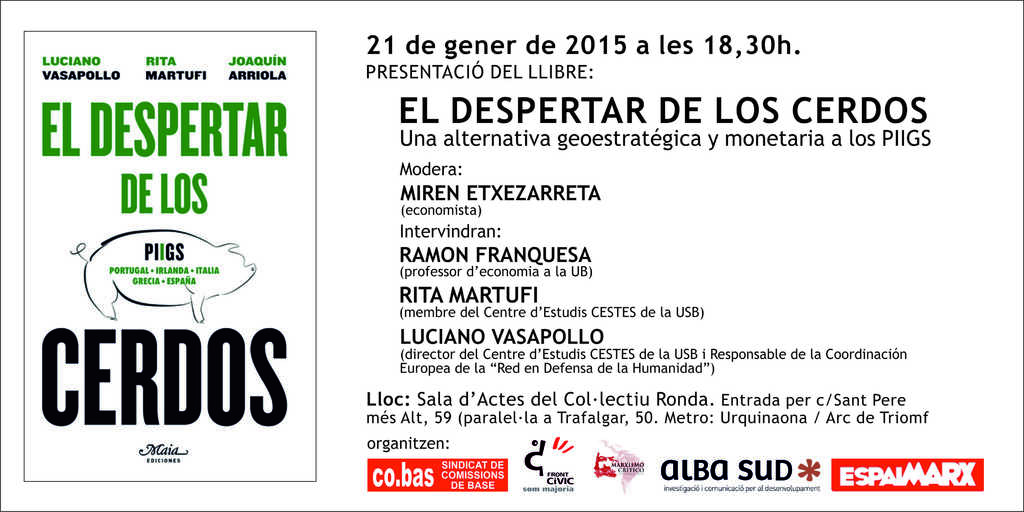 21 de gener a les 18:30 Modera: MIREN ETXEZARRETA (economista) Intervindran: RAMON FRANQUESA (professor d’economia a la UB) RITA MARTUFI (membre del Centre d’Estudis CESTES de la USB) LUCIANO VASAPOLLO (director del Centre d’Estudis CESTES de la USB i Responsable de la Coordinación Europea de la «Red en Defensa de la Humanidad») Organitzen: Cobas – Sindicat de Comissions de Base, FRONT CIVIC som majoria, Marxismo Crítico, Alba Sud i Espai Marx Lloc: Sala d’Actes Col·lectiu Ronda. Entrada per c/Sant Pere més Alt, 59 (paralel·la a Trafalgar, 50) Fuente: Marxismo crítico
21 de gener a les 18:30 Modera: MIREN ETXEZARRETA (economista) Intervindran: RAMON FRANQUESA (professor d’economia a la UB) RITA MARTUFI (membre del Centre d’Estudis CESTES de la USB) LUCIANO VASAPOLLO (director del Centre d’Estudis CESTES de la USB i Responsable de la Coordinación Europea de la «Red en Defensa de la Humanidad») Organitzen: Cobas – Sindicat de Comissions de Base, FRONT CIVIC som majoria, Marxismo Crítico, Alba Sud i Espai Marx Lloc: Sala d’Actes Col·lectiu Ronda. Entrada per c/Sant Pere més Alt, 59 (paralel·la a Trafalgar, 50) Fuente: Marxismo crítico -
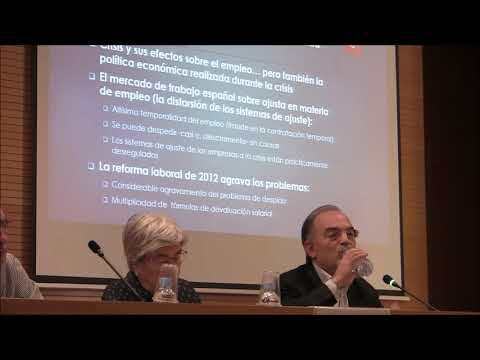 UAB Bellaterra Facultat de Dret Aula Magna 24 d ‘octubre 2019 Ponents Antonio González González. Economista, vocal del Consejo Económico y Social, i membre d'Economistes Frente a la Crisis 00:05:05 Mikel Arenas. Advocat del Col·lectiu Ronda 00:44:40 Miren Etxezarreta Zubizarreta. Catedràtica emérita de la UAB 01:10:00 Debat dirigit i moderat per Jaume García Vicente, advocat i membre de la Junta Directiva de l’ACASS Font: ATTAC Catalunya
UAB Bellaterra Facultat de Dret Aula Magna 24 d ‘octubre 2019 Ponents Antonio González González. Economista, vocal del Consejo Económico y Social, i membre d'Economistes Frente a la Crisis 00:05:05 Mikel Arenas. Advocat del Col·lectiu Ronda 00:44:40 Miren Etxezarreta Zubizarreta. Catedràtica emérita de la UAB 01:10:00 Debat dirigit i moderat per Jaume García Vicente, advocat i membre de la Junta Directiva de l’ACASS Font: ATTAC Catalunya -
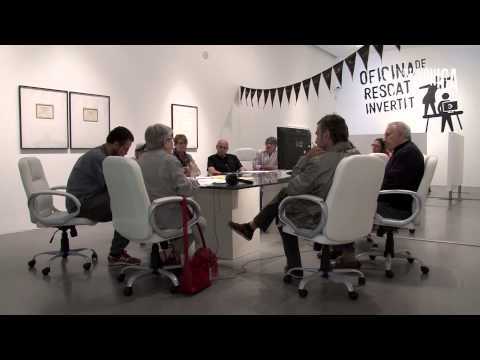 Núria Güell. Mesures de desajust. implic/Accions El programa d’accions es mostra com a una oportunitat de relació amb la reflexió que alimenta la pràctica artística de Núria Güell. Dissabte 23 de maig, 13:00 h. Aproximació a l’exposició a càrrec de l’economista Miren Etxezarreta. En un format de visita guiada el periodista proposa altres maneres d’interpretació del treball de Núria Güell i Levi Orta. Planta baixa Font: Santa Mònica
Núria Güell. Mesures de desajust. implic/Accions El programa d’accions es mostra com a una oportunitat de relació amb la reflexió que alimenta la pràctica artística de Núria Güell. Dissabte 23 de maig, 13:00 h. Aproximació a l’exposició a càrrec de l’economista Miren Etxezarreta. En un format de visita guiada el periodista proposa altres maneres d’interpretació del treball de Núria Güell i Levi Orta. Planta baixa Font: Santa Mònica -
 Jornada organizada por el Consejo Vasco del Movimiento Europeo: ESTADO EUROPEO de BIENESTAR: retos para Euskadi en el s.XXI. Mesa de debate: Retos para el Estado de bienestar Moderador: Montserrat Auzmendi Letrada. Parlamento Vasco • Ignacio Zubiri Catedrático de Hacienda Pública. UPV/EHU. Sostenimiento del Estado de Bienestar •Juan Manuel Cabasés Catedrático de Economía Aplicada. Universidad Pública de Navarra. Sanidad pública • Luis María Naya Garmendia Profesor titular de Educación Comparada. UPV/EHU. Educación para todos • Mikel de la Fuente Profesor de la UPV/EHU Pensiones dignas • Miren Etxezarreta Catedrática emérita de Economía Aplicada. Universidad Autónoma de Barcelona Servicios públicos de calidad
Jornada organizada por el Consejo Vasco del Movimiento Europeo: ESTADO EUROPEO de BIENESTAR: retos para Euskadi en el s.XXI. Mesa de debate: Retos para el Estado de bienestar Moderador: Montserrat Auzmendi Letrada. Parlamento Vasco • Ignacio Zubiri Catedrático de Hacienda Pública. UPV/EHU. Sostenimiento del Estado de Bienestar •Juan Manuel Cabasés Catedrático de Economía Aplicada. Universidad Pública de Navarra. Sanidad pública • Luis María Naya Garmendia Profesor titular de Educación Comparada. UPV/EHU. Educación para todos • Mikel de la Fuente Profesor de la UPV/EHU Pensiones dignas • Miren Etxezarreta Catedrática emérita de Economía Aplicada. Universidad Autónoma de Barcelona Servicios públicos de calidad -
 Enregistrament íntegre de la conferència telemàtica sobre pensions públiques, convocada per la Coordinadora balear per la defensa de les pensions públiques, amb la participació de l’economista Miren Etxezarreta i l’advocat laboralista Miquel Arenas, el 28 de març de 2021 Su intervención empeiza en el minuto 41:07. . Font: mirenetxezarreta.net
Enregistrament íntegre de la conferència telemàtica sobre pensions públiques, convocada per la Coordinadora balear per la defensa de les pensions públiques, amb la participació de l’economista Miren Etxezarreta i l’advocat laboralista Miquel Arenas, el 28 de març de 2021 Su intervención empeiza en el minuto 41:07. . Font: mirenetxezarreta.net -
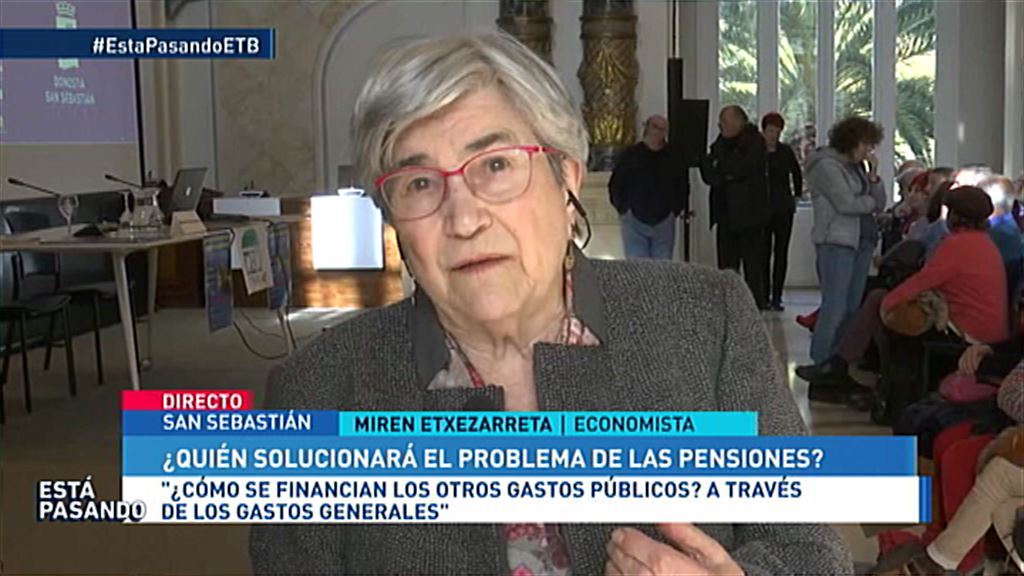 La economista Miren Etxezarreta habla sobre el futuro de las pensiones. Asegura que habría que preguntarse cómo se financian los demás gastos públicos y por qué no suponen un problema. Fuente: editor
La economista Miren Etxezarreta habla sobre el futuro de las pensiones. Asegura que habría que preguntarse cómo se financian los demás gastos públicos y por qué no suponen un problema. Fuente: editor -
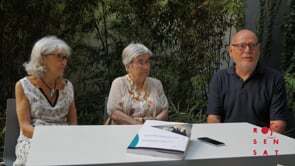
-
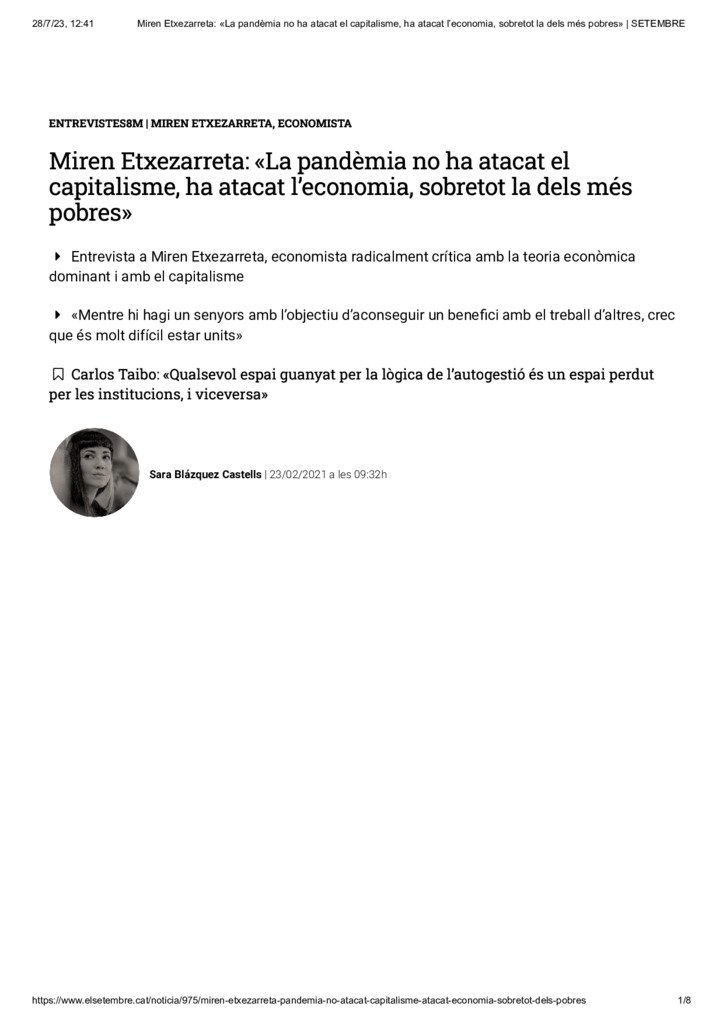 Entrevista amb l’economista crítica Miren Etxezarreta per a El Setembre, el 23 de febrer de 2021.
Entrevista amb l’economista crítica Miren Etxezarreta per a El Setembre, el 23 de febrer de 2021. -
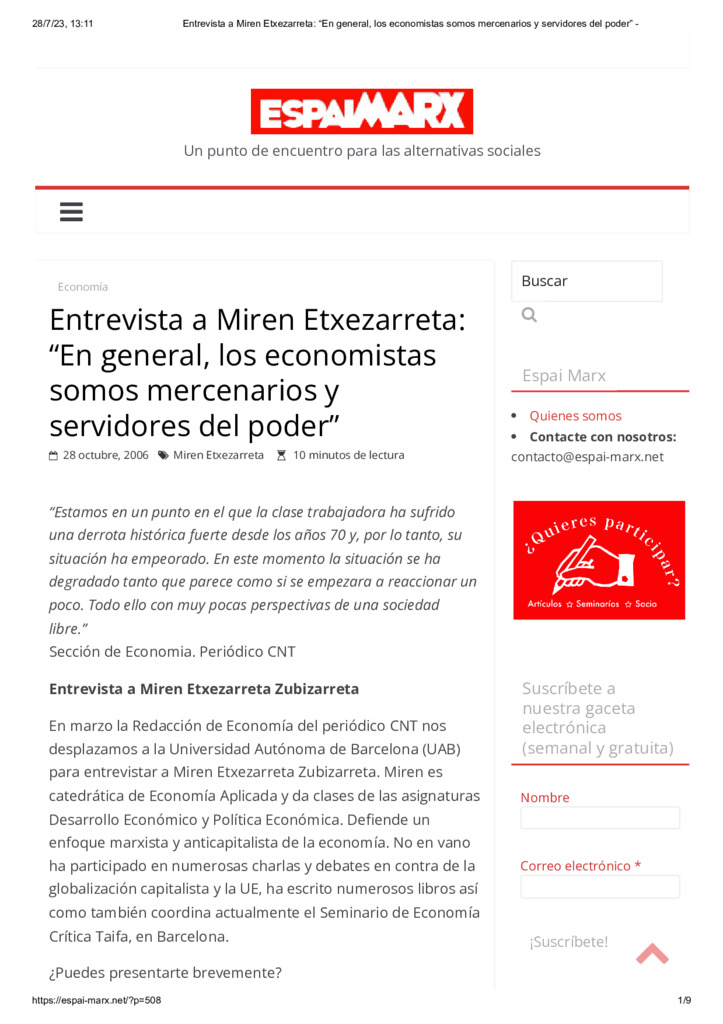
-
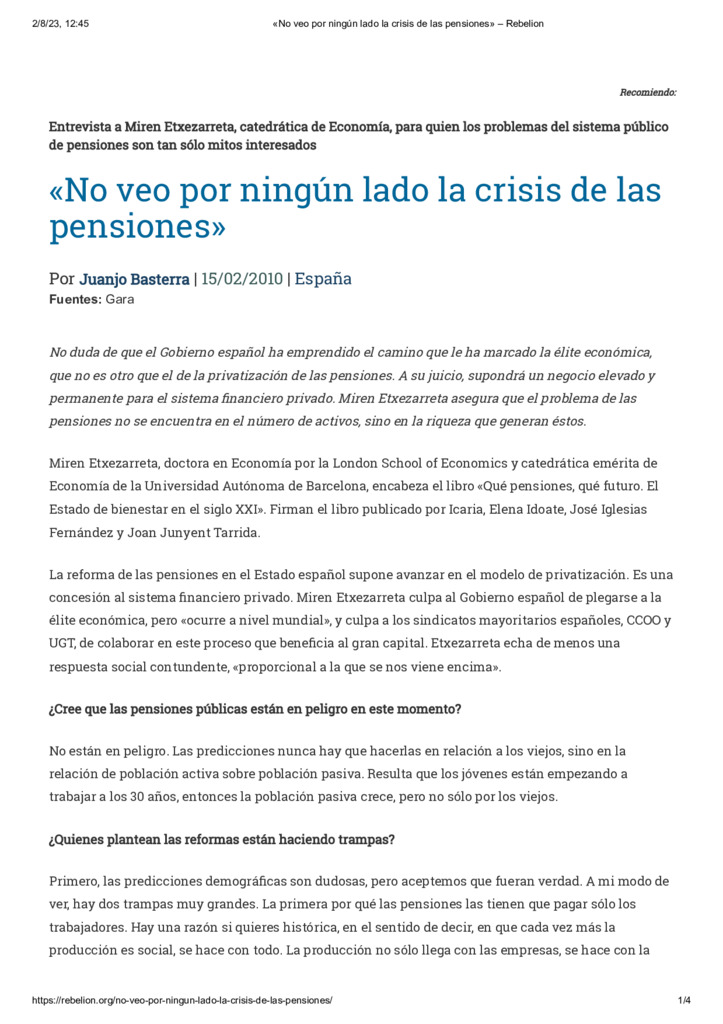 Entrevista a Miren Etxezarreta, catedrática de Economía, para quien los problemas del sistema público de pensiones son tan sólo mitos interesados «No veo por ningún lado la crisis de las pensiones»
Entrevista a Miren Etxezarreta, catedrática de Economía, para quien los problemas del sistema público de pensiones son tan sólo mitos interesados «No veo por ningún lado la crisis de las pensiones» -
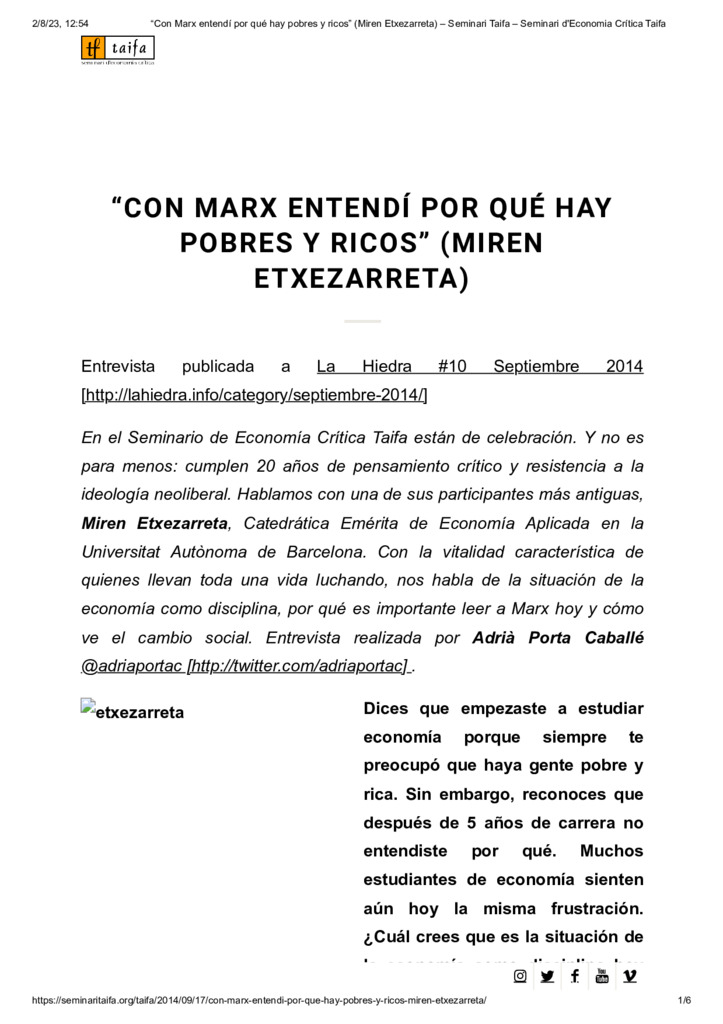
-
 Esta semana continuamos con el repaso a la historia del capitalismo. Contaremos con la colaboración de la economista crítica Miren Etxezarreta, con quien hablaremos sobre algunas de las contradicciones del capitalismo, el papel de instituciones como el FMI y, sobretodo, incidiremos sobre el carácter del Capitalismo como el sistema de una clase concreta. La reducida clase capitalista que es la única que se beneficia de este modelo económico, ideológico y político. No te pierdas el programa perfecto para gritar al unísono: ¡Viva el mal, viva el Capital! Podcast la linterna de diógenes: https://www.ivoox.com/podcast-podcast-linterna-diogenes_sq_f136870_1.html Fuente: editor
Esta semana continuamos con el repaso a la historia del capitalismo. Contaremos con la colaboración de la economista crítica Miren Etxezarreta, con quien hablaremos sobre algunas de las contradicciones del capitalismo, el papel de instituciones como el FMI y, sobretodo, incidiremos sobre el carácter del Capitalismo como el sistema de una clase concreta. La reducida clase capitalista que es la única que se beneficia de este modelo económico, ideológico y político. No te pierdas el programa perfecto para gritar al unísono: ¡Viva el mal, viva el Capital! Podcast la linterna de diógenes: https://www.ivoox.com/podcast-podcast-linterna-diogenes_sq_f136870_1.html Fuente: editor -
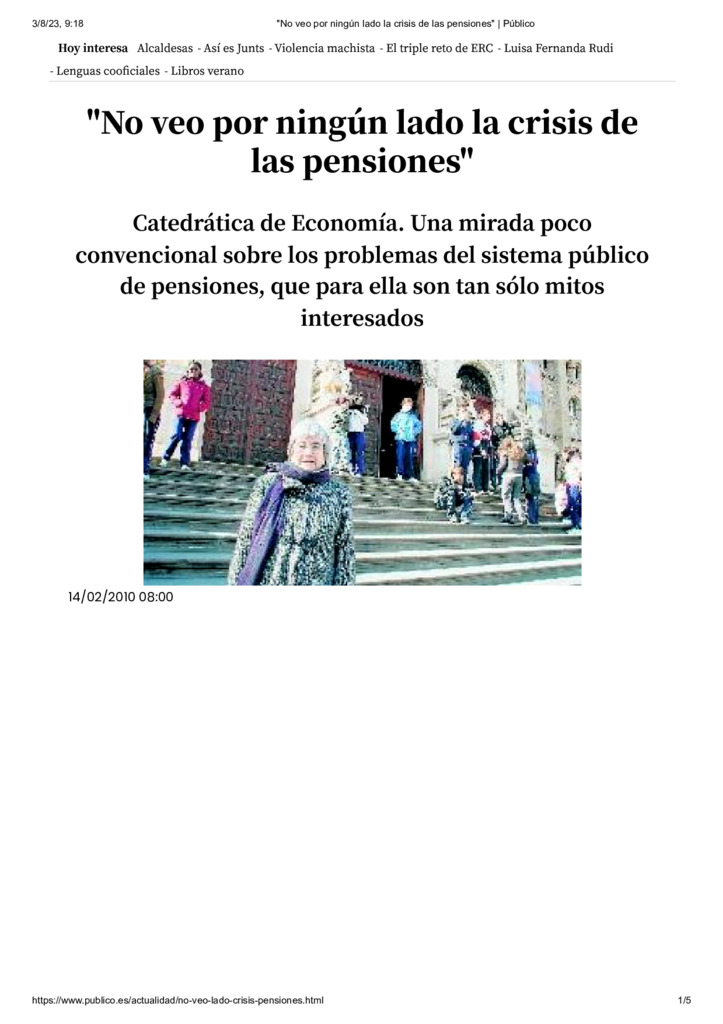
-
 El debate sobre el futuro de las pensiones no para de crecer en el Estado español. La preocupación de los pensionistas sobre el futuro de su pensión aumenta cada día. Y no digamos la de aquellos que están cerca de jubilarse. Las malas noticias se van acumulando. Al Fondo de Reserva de la Seguridad Social, que llegó a tener más de 66.000 millones de euros, le quedan ahora poco más de 15.000 millones según el Gobierno. La paga extra de diciembre de este año no podrá pagarse con estos fondos, como se ha hecho estos años, porque estarán agotados. El gobierno del PP, en cinco años, se ha cargado la «hucha de las pensiones» y, ahora, echa la culpa a la ciudadanía. Que si hay muchos pensionistas, que si cobran mucho, que viven más años que antes, son frases que suelen pronunciar miembros del Gobierno del Partido Popular. Sus propuestas: pues parece que alargar la jubilación a los 67 años parece que se les queda corto. Muchos ya piensan en que a los 70, de momento, sería ideal. Es una manera fina de reducir pensionistas, tardarán más en serlo y durarán menos ya que llegarán más «trabajados», es decir, menos sanos. Radio Klara, de Valencia, entrevista sobre el tema de las pensiones a Miren Etxezarreta, del Seminario de Economía Crítica Taifa y catedrática emérita de Economía Aplicada por la Universidad Autónoma de Barcelona quien responde a la pregunta: ¿están las pensiones en peligro? Fuente: Más Voces. El informativo de las radios libres y comunitarias
El debate sobre el futuro de las pensiones no para de crecer en el Estado español. La preocupación de los pensionistas sobre el futuro de su pensión aumenta cada día. Y no digamos la de aquellos que están cerca de jubilarse. Las malas noticias se van acumulando. Al Fondo de Reserva de la Seguridad Social, que llegó a tener más de 66.000 millones de euros, le quedan ahora poco más de 15.000 millones según el Gobierno. La paga extra de diciembre de este año no podrá pagarse con estos fondos, como se ha hecho estos años, porque estarán agotados. El gobierno del PP, en cinco años, se ha cargado la «hucha de las pensiones» y, ahora, echa la culpa a la ciudadanía. Que si hay muchos pensionistas, que si cobran mucho, que viven más años que antes, son frases que suelen pronunciar miembros del Gobierno del Partido Popular. Sus propuestas: pues parece que alargar la jubilación a los 67 años parece que se les queda corto. Muchos ya piensan en que a los 70, de momento, sería ideal. Es una manera fina de reducir pensionistas, tardarán más en serlo y durarán menos ya que llegarán más «trabajados», es decir, menos sanos. Radio Klara, de Valencia, entrevista sobre el tema de las pensiones a Miren Etxezarreta, del Seminario de Economía Crítica Taifa y catedrática emérita de Economía Aplicada por la Universidad Autónoma de Barcelona quien responde a la pregunta: ¿están las pensiones en peligro? Fuente: Más Voces. El informativo de las radios libres y comunitarias
